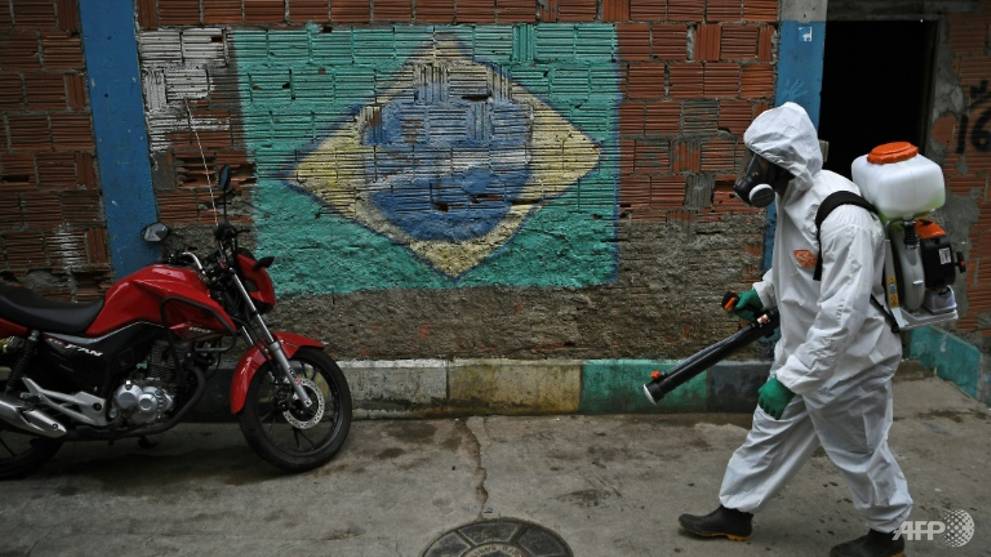
Poor and black, northeast Brazil faces COVID-19 'hurricane'
RIO DE JANEIRO: Brazil's northeast, a harsh place of arid land, cyclical drought and crushing poverty, is emerging as the next crisis zone in the coronavirus pandemic.
As the virus surges in Brazil - which now has the second-most cases in the world after the United States - the country's poorest region has been hit hard, both by the disease and the painful measures taken to contain it.
The nine states of the northeast have the second-highest number of cases and deaths in Brazil, after the wealthy southeast, where the outbreak began.
For the 7.7 million people in the northeast who live on less than US$2 a day, getting by is hard in the best of times.
Add lockdowns that have interrupted the meager services they depend on - things like school lunches for hungry children and water deliveries for those who have none - and they are being pushed to the brink.
"In 26 years, I've never seen so many people living in fear, so many people going hungry," said Alcione Albanesi, founder of the charity Amigos do Bem.
"Everything has ground to a stop. But hunger doesn't stop."
Her organization distributes food, water and hygiene supplies to communities in the hot, dry Sertao, or "backcountry," where many families scrape out a living farming the cracked, unforgiving earth.
Preventive measures such as hand-washing are theoretical there, at best. Many people barely have water.
Those who get sick often face a long trip to the nearest town in an oxcart, then several hours of public transportation to the hospital.
When they arrive, hospitals sometimes lack basic supplies, even bed sheets, said Albanesi.

MIGRANTS TURNED VECTORS
The pandemic is accelerating fast in the northeast, spreading from coastal capitals such as Salvador, Recife and Fortaleza to the interior.
In early April, the region had 17.6 per cent of the total coronavirus cases in Brazil. Today, the proportion has risen to 33.7 per cent.
The region has registered nearly 150,000 cases, and almost 8,000 deaths, out of 27,000 nationwide.
It is no coincidence its caseload has followed close on the heels of that of the southeast, the business and industrial corridor that includes Sao Paulo and Rio de Janeiro.
Countless migrants who left the northeast to work in the southeast lost their jobs because of stay-at-home measures.
Brazilian media have documented how many of them are returning home, taking clandestine buses that use dirt roads to skirt lockdown measures.
And some of those workers are carrying the virus home.
"Every day in Sao Paulo, buses, vans and cars are leaving (for the northeast). Who's controlling those people when they get to the interior? No one. Nobody even sees them," one driver told the newspaper Folha de Sao Paulo.
POVERTY AND POLITICS
The northeast is sometimes called the "Cradle of Brazil," because it is where the Portuguese founded their first colonial capital, Salvador.
But it has long been marginalized.
Home to 57 million of Brazil's 210 million people, it has the country's largest proportion of black inhabitants, as well as the most people living in extreme poverty.
A left-wing bastion, it is the only one of Brazil's five regions that did not vote for far-right President Jair Bolsonaro in the 2018 election.
Bolsonaro has a tense relationship with the region.
He has used the pejorative word "paraibas" to refer to its inhabitants. And he has been accused of racism for his treatment of Afro-Brazilians, saying for example that they "do nothing" and jokingly calling a black lawmaker his "slave."
When the virus arrived in Brazil and Bolsonaro downplayed it as a "little flu," the northeast took matters into its own hands.
The region's governors launched an expert committee to respond to the crisis, chaired by one of Brazil's best-known doctors, neuroscientist Miguel Nicolelis.
"The northeast didn't get much financial help from the federal government... because of this political animosity," Nicolelis told AFP.
Working with the resources at hand, his committee has implemented a strategy to slow the spread of the virus, including emergency health brigades and a cell phone app to identify suspected cases, which has been downloaded 200,000 times.
Still, he compares the job to "being in the middle of a hurricane without a raincoat."
Many hospitals in the region are on the brink of collapse.
"It's a very intense battle," said Health Secretary Jailson Correia of Recife, the capital of Pernambuco state.
Correia has managed to open seven field hospitals. But he is struggling to staff them, with 471 medical professionals out sick.
With the outbreak still growing exponentially, "the stress level is extremely high," he said.
BOOKMARK THIS: Our comprehensive coverage of the coronavirus outbreak and its developments
Download our app or subscribe to our Telegram channel for the latest updates on the coronavirus outbreak: https://cna.asia/telegram